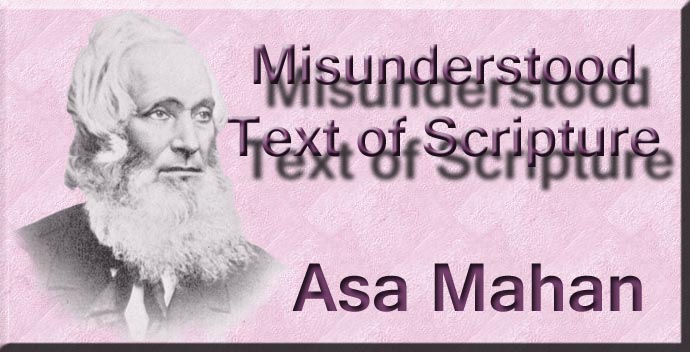
Misunderstood Text of Scripture
By Rev. Asa Mahan
Preface
|
WHENEVER the privileges and immunities of believers in Jesus are set forth in accordance with those teachings represented by such terms as the Higher Life, the Rest of Faith, Perfect Love, and Full Consecration, a certain specific number of passages of Scripture are, by the opposers of those views, cited in disproof of the same. These passages are set forth with no argument to show what their meaning must be, but with the assumption that their meaning is too plain to be misapprehended, and as for ever settling the question at issue. About forty years since, I put into the hands of my Biblical Instructor, the celebrated Moses Stuart, of Andover, Massachusetts, U.S., a work containing a carefully-written exposition of all those passages. I did so with the statement that I had expounded these and other passages in the light of the principles of Biblical interpretation which he had taught me, and with the earnest request that, if I had erred in the application of those principles, he would show me wherein I had done so. When I next met the aged and venerable Professor, he addressed me in these words: "I have read your book as you requested. I have done so with much interest and profit. I find the argument throughout sound and scriptural." The most careful subsequent observations of quite forty years' continuance have fully confirmed the writer in the absolute assurance of the correctness of those expositions, together with the assurance, equally absolute, that not one of these passages, when correctly interpreted, has the remotest bearing in opposition to the Higher Life teachings, while most of them confirm such teachings. Those expositions, in a flew, enlarged, and matured form, are set forth in the following pages. The design of the author in publishing this little work is, not only to take a great stumbling block out of the way of enquirers after a knowledge of their revealed privileges, as believers in Jesus, but to furnish a greatly needed Manual to which an appeal may be confidently had, when any of these passages are cited in disproof of the teachings under consideration. London, Nov. 22, 1876. |
|
 |
 |
|
|
|
-
Site Navigation
 Home
Home What's New
What's New Bible
Bible Photos
Photos Hiking
Hiking E-Books
E-Books Genealogy
Genealogy Profile
Free Plug-ins You May Need
Profile
Free Plug-ins You May Need
 Get Java
Get Java.png) Get Flash
Get Flash Get 7-Zip
Get 7-Zip Get Acrobat Reader
Get Acrobat Reader Get TheWORD
Get TheWORD